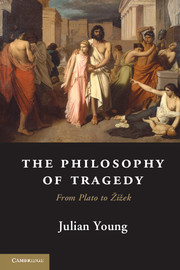Book contents
4 - Hume
Published online by Cambridge University Press: 05 June 2013
Summary
David Hume (1711–76), urbane and cosmopolitan, historian, economist and philosopher, was one of the two giants of the so-called Scottish Enlightenment. (The other was Adam Smith.) He begins his essay ‘Of Tragedy’ by remarking, in his elegant and engaging prose, ‘It seems an unaccountable pleasure that the spectators of a well-written tragedy receive from sorrow, terror, anxiety, and other passions, that are in themselves disagreeable and uneasy’ (OT, p. 29). Hume’s interest, in other words, is focused on precisely what in the preceding chapter (p. 47) we saw dramaturgical theorists such as René Rapin to be insensible to, the paradoxical nature of tragic pleasure.
One surprising thing that quickly becomes clear in Hume’s essay is that he has not read Aristotle’s Poetics. What makes this somewhat surprising is that he was well acquainted with the seventeenth-century French neo-classical tradition, a tradition which, as we have seen, repeatedly genuflects to Aristotle and which Hume discusses in his essay ‘On the Standards of Taste’. What makes it nonetheless clear that he has not read the Poetics is not merely the fact that he never mentions Aristotle by name but also his observation that spectators of tragedy are ‘never so happy as when they employ tears, sobs, and cries, to give vent to their sorrow, and relieve their heart, swoln with the tenderest sympathy and compassion’ (OT, p. 29). The phrase ‘giving vent to’ comes within a hairsbreadth of stating the medical-ethical account of catharsis (pp. 26–31 above) and, had Hume read Aristotle, would surely have given rise to at least a mention of that notion. In fact, however, it is clear that it never crosses his mind that catharsis could be the explanation of tragic pleasure, since he veers off in an entirely different direction in the search of an explanation.
- Type
- Chapter
- Information
- The Philosophy of TragedyFrom Plato to Žižek, pp. 58 - 67Publisher: Cambridge University PressPrint publication year: 2013



